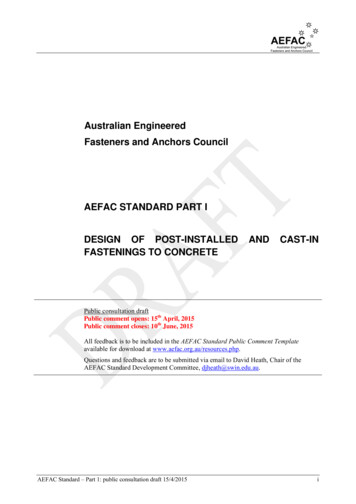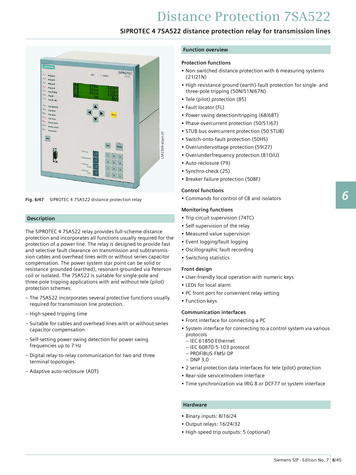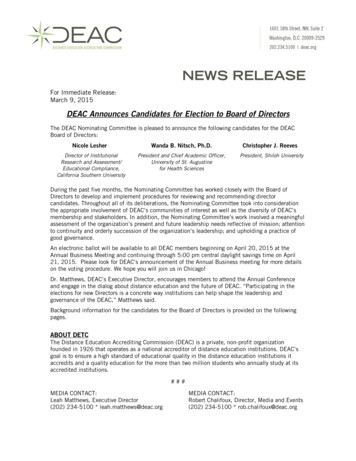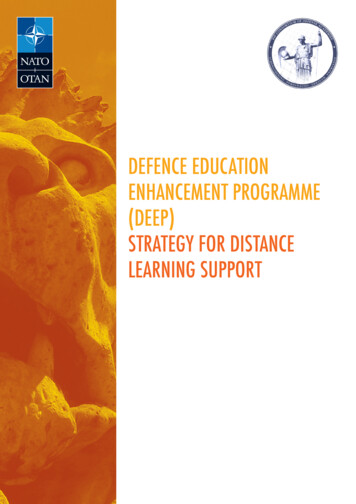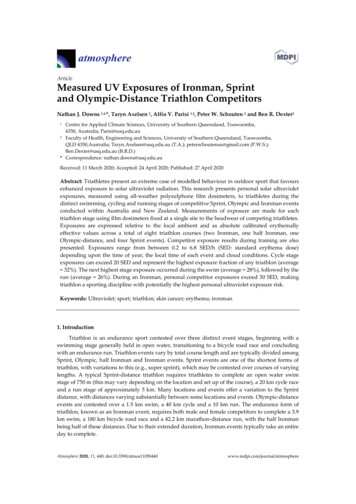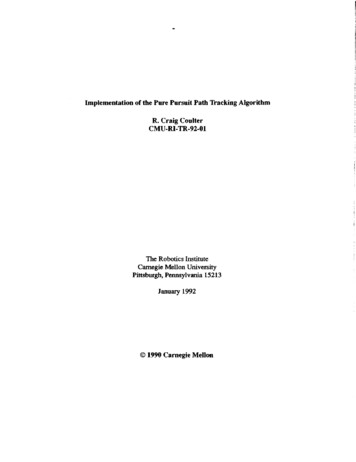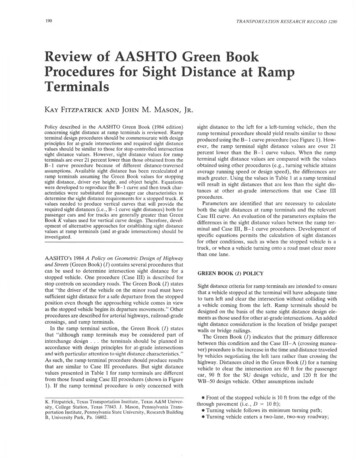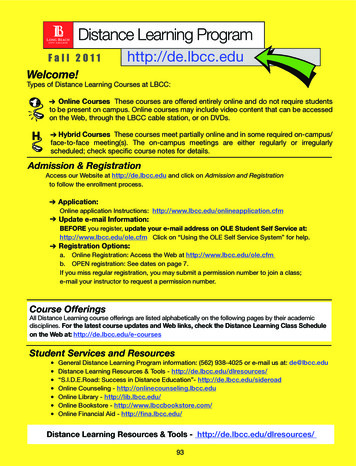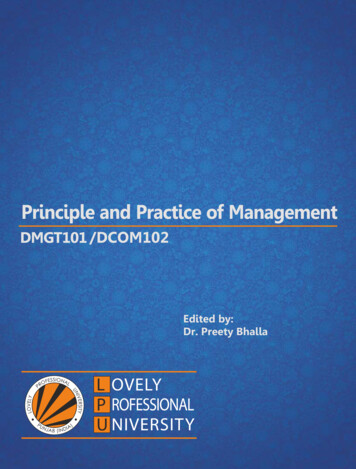
Transcription
/DCOM102Edited by:Dr. Preety Bhalla
PRINCIPLES ANDPRACTICES OF MANAGEMENTEdited ByDr. Preety Bhalla
Printed byEXCEL BOOKS PRIVATE LIMITEDA-45, Naraina, Phase-I,New Delhi-110028forLovely Professional UniversityPhagwara
SYLLABUSPrinciples and Practices of ManagementObjectives: To acquaint students with the terms, concepts, and points of view used in management and its historical evolution,ethics, social responsibility and environmental issues. Some other objectives of the course are:Provide students with a working knowledge of the skills and functions necessary to be an effective, efficient manager.Provide an introduction to the theory and practice of managing organizations.Examine the management functions (planning, organizing, leading or influencing, and controlling) and the impact ofthose functions on the business organization.DCOM102Sr. No.1DesriptionManagement: Definition, nature, purpose and scope of management, Skills androles of a Manager, functions, principles; Evolution of Management Thought,Scientific Management.2Planning: Types of plans, planning process, Characteristics of planning,Traditional objective setting, Strategic Management, premising and forecasting.3Decision-Making: Process, Simon’s model of decision making, creative problemsolving, group decision making.4Management by Objectives: Management by exception; Styles of management:(American, Japanese and Indian), McKinsey’s 7-S Approach, Self Management.5Organizing: Organizational design and structure, Coordination, differentiationand integration.6Span of management, centralization and de-centralization Delegation, Authority &power - concept & distinction, Line and staff organizations.7Staffing: Human Resource Management and Selection, Performance appraisal andCareer strategy, Coordination- Concepts, issues and techniques.8Organizational Change: Introduction, Resistance to Change, BehaviouralReactions to Change, Approaches Or Models to Managing Organisational Change.9Leading: Human Factors and Motivation, Leadership, Communication, Teamsand Team Work.10Controlling: Concept, planning-control relationship, process of control, Types ofControl, Control Techniques.
DMGT101Sr. No.DESCRIPTION1.Management: Definition, nature, purpose and scope of management, Skills and roles of aManager, functions, principles; Evolution of Management Thought, Scientific Management.2.Planning: Types of plans, planning process, Characteristics of planning, Traditional objectivesetting, Strategic Management, premising and forecasting.Decision-Making: Process, Simon’s model of decision making, creative problem solving,group decision making.Management by Objectives: Management by exception; Styles of management: (American,Japanese and Indian), McKinsey’s 7-S Approach, Self Management.Organizing: Organizational design and structure, Coordination, differentiation andintegration.Span of management, centralization and de-centralization Delegation, Authority & power concept & distinction, Line and staff organizations. Coordination: Concepts, issues andtechniques.Staffing: Human Resource Management and Selection, Performance appraisal and Careerstrategy, Managing Change.Leading: Human Factors and Motivation, Leadership, Communication, Teams and TeamWork.Controlling: Concept, planning-control relationship, process of control, Types of Control,Control Techniques.3.4.5.6.7.8.9.
CONTENTUnit 1:Introduction to Management1Amit Kumar Sharma, Lovely Professional UniversityUnit 2:Evolution of Management Thought21Pretty Bhalla, Lovely Professional UniversityUnit 3:Planning50Amit Kumar Sharma, Lovely Professional UniversityUnit 4:Forecasting and Premising68Pretty Bhalla, Lovely Professional UniversityUnit 5:Decision-making79Amit Kumar Sharma, Lovely Professional UniversityUnit 6:Management by Objectives and Styles of Management91Pretty Bhalla, Lovely Professional UniversityUnit 7:Organising107Amit Kumar Sharma, Lovely Professional UniversityUnit 8;Span of Management135Pretty Bhalla, Lovely Professional UniversityUnit 9:Delegation, Authority and Power147Amit Kumar Sharma, Lovely Professional UniversityUnit 10:Staffing and Coordination161Pretty Bhalla, Lovely Professional UniversityUnit 11:Performance Appraisal and Career Strategy183Amit Kumar Sharma, Lovely Professional UniversityUnit 12:Organisational Change203Pretty Bhalla, Lovely Professional UniversityUnit 13:Motivation and Leadership226Amit Kumar Sharma, Lovely Professional UniversityUnit 14:Communication254Anand Thakur, Lovely Professional UniversityUnit 15:Team and Team WorkAnand Thakur, Lovely Professional UniversityUnit 16:264ControllingAnand Thakur, Lovely Professional University278
Corporate and Business Law6LOVELY PROFESSIONAL UNIVERSITY
Amit Kumar Sharma, Lovely Professional UniversityUnit 1: Introduction to ManagementUnit 1: Introduction to finition of Management1.2Nature of Management1.3Scope of Management1.4Purpose of Management1.5Characteristics of Management1.6Management – An Emerging Profession1.7Who is a Manager?1.8Roles of a Manager1.9Skills of an Effective Manager1.10 Functions of a Manager1.11 Summary1.12 Keywords1.13 Self Assessment1.14 Review Questions1.15 Further ReadingsObjectivesAfter studying this unit, you will be able to:Define managementState the nature, purpose and scope of managementIdentify roles and skills of a managerExplain the functions of a managerDiscuss Henry Fayol’s Principles of ManagementIntroductionManagement is a vital aspect of the economic life of man, which is an organised group activity.A central directing and controlling agency is indispensable for a business concern. The productiveresources - material, labour, capital etc. are entrusted to the organising skill, administrativeability and enterprising initiative of the management. Thus, management provides leadershipto a business enterprise. Without able managers and effective managerial leadership the resourcesof production remain merely resources and never become production. Under competitiveeconomy and ever-changing environment the quality and performance of managers determineboth the survival as well as success of any business enterprise. Management occupies such anLOVELY PROFESSIONAL UNIVERSITY1
Principles and Practices of ManagementNotesimportant place in the modern world that the welfare of the people and the destiny of thecountry are very much influenced by it.1.1 Definition of ManagementManagement may be defined in many different ways. Many eminent authors on the subject havedefined the term “management”, some of these definitions are reproduced below:According to Lawrence A Appley, “Management is the development of people and not thedirection of things”.According to Joseph Massie, “Management is defined as the process by which a co-operativegroup directs action towards common goals”.In the words of George R Terry, “Management is a distinct process consisting of planning,organising, actuating and controlling performed to determine and accomplish the objectives bythe use of people and resources”.According to James L Lundy, “Management is principally the task of planning, co-ordinating,motivating and controlling the efforts of others towards a specific objective”.In the words of Henry Fayol, “To manage is to forecast and to plan, to organise, to command, toco-ordinate and to control”.According to Peter F Drucker, “Management is a multi-purpose organ that manages a businessand manages managers and manages worker and work”.In the words of J.N. Schulze, “Management is the force which leads, guides and directs anorganisation in the accomplishment of a pre-determined object”.In the words of Koontz and O’Donnel, “Management is defined as the creation and maintenanceof an internal environment in an enterprise where individuals working together in groups canperform efficiently and effectively towards the attainment of group goals”.According to Ordway Tead, “Management is the process and agency which directs and guidesthe operations of an organisation in realising of established aims”.According to Stanley Vance, “Management is simply the process of decision-making and controlover the actions of human beings for the express purpose of attaining pre-determined goals”.According to Wheeler, “Business management is a human activity which directs and controlsthe organisation and operation of a business enterprise. Management is centred in theadministrators of managers of the firm who integrate men, material and money into an effectiveoperating limit”.In the words of William Spriegel, “Management is that function of an enterprise which concernsitself with the direction and control of the various activities to attain the business objectives”.In the words of S. George, “Management consists of getting things done through others. Manageris one who accomplishes the objectives by directing the efforts of others”.In the words of Keith and Gubellini, “Management is the force that integrates men and physicalplant into an effective operating unit”.According to Newman, Summer and Warren, “The job of management is to make cooperativeendeavour to function properly. A manager is one who gets things done by working withpeople and other resources”.According to John F M, “Management may be defined as the art of securing maximum resultswith a minimum of effort so as to secure maximum results with a minimum of effort so as to2LOVELY PROFESSIONAL UNIVERSITY
Unit 1: Introduction to Managementsecure maximum prosperity and happiness for both employer and employee and give thepublic the best possible service”.NotesIn the words of Kimball and Kimball, “Management embraces all duties and functions thatpertain to the initiation of an enterprise, its financing, the establishment of all major policies,the provision of all necessary equipment, the outlining of the general form of organisationunder which the enterprise is to operate and the selection of the principal officers. The group ofofficials in primary control of an enterprise is referred to as management”.In the words of E.F.L. Brech, “Management is a social process entailing responsibility for theeffective and economical planning and regulation of the operations of an enterprise, in fulfilmentof a given purpose or task, such responsibility involving:1.judgement and decision in determining plans and in using data to control performance,and progress against plans; and2.the guidance, integration, motivation and supervision of the personnel composing theenterprise and carrying out its operations”.According to E. Peterson and E.G Plowman, Management is “a technique by means of which thepurpose and objectives of a particular human group are determined, classified and effectuated”.According to Mary Cushing Niles, “Good management or scientific management achieves asocial objective with the best use of human and material energy and time and with satisfactionfor the participants and the public”.From the definitions quoted above, it is clear the “management” is a technique of extractingwork from others in an integrated and co-ordinated manner for realising the specific objectivesthrough productive use of material resources. Mobilising the physical, human and financialresources and planning their utilisation for business operations in such a manner as to reach thedefined goals can be referred to as “management”. If the views of the various authorities arecombined, management could be defined as “a distinct ongoing process of allocating inputs ofan organisation (human and economic resources) by typical managerial functions (planning,organising, directing and controlling) for the purpose of achieving stated objectives namely –output of goods and services desired by its customers (environment). In the process, work ispreformed with and through personnel of the organisation in an ever-changing businessenvironment”.Management is a universal process in all organised social and economic activities. It is notmerely restricted to factory, shop or office. It is an operative force in all complex organisationstrying to achieve some stated objectives. Management is necessary for a business firm,government enterprises, education and health services, military organisations, trade associationsand so on.1.2 Nature of ManagementAn analysis of the various definitions of management indicates that management has certaincharacteristics. The following are the salient characteristics of management.1.Management aims at reaping rich results in economic terms: Manager’s primary task is tosecure the productive performance through planning, direction and control. It is expectedof the management to bring into being the desired results. Rational utilisation of availableresources to maximise the profit is the economic function of a manager. Professionalmanager can prove his administrative talent only by economising the resources andenhancing profit. According to Kimball, “management is the art of applying the economicprinciples that underlie the control of men and materials in the enterprise underconsideration”.LOVELY PROFESSIONAL UNIVERSITY3
Principles and Practices of ManagementNotes42.Management also implies skill and experience in getting things done through people:Management involves doing the job through people. The economic function of earningprofitable return cannot be performed without enlisting co-operation and securing positiveresponse from “people”. Getting the suitable type of people to execute the operations isthe significant aspect of management. In the words of Koontz and O’Donnell, “Managementis the art of getting things done through people in formally organised groups”.3.Management is a process: Management is a process, function or activity. This processcontinues till the objectives set by administration are actually achieved. “Management isa social process involving co-ordination of human and material resources through thefunctions of planning, organising, staffing, leading and controlling in order to accomplishstated objectives”.4.Management is a universal activity: Management is not applicable to business undertakingsonly. It is applicable to political, social, religious and educational institutions also.Management is necessary when group effort is required.5.Management is a science as well as an art: Management is an art because there are definiteprinciples of management. It is also a science because by the application of these principlespredetermined objectives can be achieved.6.Management is a profession: Management is gradually becoming a profession becausethere are established principles of management which are being applied in practice, and itinvolves specialised training and is governed by ethical code arising out of its socialobligations.7.Management is an endeavour to achieve pre-determined objectives: Management isconcerned with directing and controlling of the various activities of the organisation toattain the pre-determined objectives. Every managerial activity has certain objectives. Infact, management deals particularly with the actual directing of human efforts.8.Management is a group activity: Management comes into existence only when there is angroup activity towards a common objective. Management is always concerned with groupefforts and not individual efforts. To achieve the goals of an organisation managementplans, organises, co-ordinates, directs and controls the group effort.9.Management is a system of authority: Authority means power to make others act in apredetermined manner. Management formalises a standard set of rules and procedure tobe followed by the subordinates and ensures their compliance with the rules andregulations. Since management is a process of directing men to perform a task, authorityto extract the work from others is implied in the very concept of management.10.Management involves decision-making: Management implies making decisions regardingthe organisation and operation of business in its different dimensions. The success orfailure of an organisation can be judged by the quality of decisions taken by the managers.Therefore, decisions are the key to the performance of a manager.11.Management implies good leadership: A manager must have the ability to lead and get thedesired course of action from the subordinates. According to R. C. Davis, “management isthe function of executive leadership everywhere”. Management of the high order impliesthe capacity of managers to influence the behaviour of their subordinates.12.Management is dynamic and not static: The principles of management are dynamic andnot static. It has to adopt itself according to social changes.13.Management draws ideas and concepts from various disciplines: Management is aninterdisciplinary study. It draws ideas and concepts from various disciplines like economics,statistics, mathematics, psychology, sociology, anthropology etc.LOVELY PROFESSIONAL UNIVERSITY
Unit 1: Introduction to Management14.Management is goal oriented: Management is a purposeful activity. It is concerned withthe achievement of pre-determined objectives of an organisation.15.Different levels of management: Management is needed at different levels of an organisationnamely top level, middle level and lower level.16.Need of organisation: There is the need of an organisation for the success of management.Management uses the organisation for achieving pre-determined objectives.17.Management need not be owners: It is not necessary that managers are owners of theenterprise. In joint stock companies, management and owners (capital) are different entities.18.Management is intangible: It cannot be seen with the eyes. It is evidenced only by thequality of the organisation and the results, i.e., profits, increased productivity etc.NotesIs Management a Science or an Art?A question often arises whether management is a science or art. It is said that “management isthe oldest of arts and the youngest of sciences”. This explains the changing nature of managementbut does not exactly answer what management is? To have an exact answer to the question it isnecessary to know the meanings of the terms “Science” and “Art”.What is “Science”?Science may be described, “as a systematic body of knowledge pertaining to an area of study andcontains some general truths explaining past events or phenomena”.The above definition contains three important characteristics of science. They are:1.It is a systematized body of knowledge and uses scientific methods for observation,2.Its principles are evolved on the basis of continued observation and experiment, and3.Its principles are exact and have universal applicability without any limitation.Judging from the above characteristics of science, it may be observed that:1.Management is a systematized body of knowledge and its principles have evolved on thebasis of observation.2.The kind of experimentation (as in natural sciences) cannot be accompanied in the area ofmanagement since management deals with the human element.3.In management, it is not possible to define, analyse and measure phenomena by repeatingthe same conditions over and over again to obtain a proof.The above observation puts a limitation on management as a science. Management like othersocial sciences can be called as “inexact science”.What is “Art”?‘Art’ refers to “the way of doing specific things; it indicates how an objective is to be achieved.”Management like any other operational activity has to be an art. Most of the managerial actshave to be cultivated as arts of attaining mastery to secure action and results.The above definition contains three important characteristics of art. They are:1.Art is the application of science. It is putting principle into practice.LOVELY PROFESSIONAL UNIVERSITY5
Principles and Practices of ManagementNotes2.After knowing a particular art, practice is needed to reach the level of perfection.3.It is undertaken for accomplishing an end through deliberate efforts.Judging from the above characteristics of art, it may be observed that:1.Management while performing the activities of getting things done by others is requiredto apply the knowledge of certain underlying principles which are necessary for every art.2.Management gets perfection in the art of managing only through continuous practice.3.Management implies capacity to apply accurately the knowledge to solve the problems,to face the situation and to realise the objectives fully and timely.The above observation makes management an art and that to a fine art.Management is both a Science as well as an ArtManagement is both a science as well as an art. The science of management provides certaingeneral principles which can guide the managers in their professional effort. The art ofmanagement consists in tackling every situation in an effective manner. As a matter of fact,neither science should be over-emphasised nor should be the art discounted; the science and theart of management go together and are both mutually interdependent and complimentary.Management is thus a science as well as an art. It can be said that-”the art of management is as oldas human history, but the science of management is an event of the recent past.”1.3 Scope of ManagementThe scope of management is too wide to be covered in a few pages. Herbison and Myres have yettried to restrict it under three broad groups, viz.1.Economic Resource2.System of Authority3.Class or EliteLet us understand each of them one by one.61.Economic Resource: Business Economics classifies the factors of production into four basicinputs, viz. land, labour, capital and entrepreneur. By the use of all these four, basicproduction can be done. But to turn that into a profitable venture, an effective utilizationof man, money, material, machinery and methods of production has to be ensured. This isguaranteed by application of management fundamentals and practices. The better is themanagement of an enterprise, the higher is its growth rate in terms of profit, sales,production and distribution. Thus management itself serves as an economic resource.2.System of Authority: As already discussed, management is a system of authority. Itformalises a standard set of rules and procedure to be followed by the subordinates andensures their compliance with the rules and regulations. Since management is a process ofdirecting men to perform a task, authority to extract the work from others is implied inthe very concept of management.3.Class or Elite: Management is considered to be a distinct class that has its own valuesystem. Managerial class, often referred to as a collective group of those individuals thatperform managerial activities is essential component of each organisation. The importancethe class has become so huge that the entire group of mangers is known as “management”in every organisation.LOVELY PROFESSIONAL UNIVERSITY
Unit 1: Introduction to ManagementNotes1.4 Purpose of ManagementThe purpose of management can be understood as following:1.Reducing ambiguity in methods of working,2.Keeping costs down, and motivating others to do the same.3.Taking calculated risks4.Managing prospective risk5.Exercise good judgementTaskIllustrate an example of managerial activities you ever involved in andenlist the purposes of each of them.1.5 Characteristics of ManagementManagement is a distinct activity having the following salient features or characteristics:1.Economic Resource: Management is an important economic resource together with land,labour and capital. As industrialization grows, the need for managers increases. Efficientmanagement is the most critical input in the success of any organised group activity as itis the force which assembles and integrates other factors of production, namely, labour,capital and materials.2.Goal Oriented: Management is a purposeful activity. It coordinates the efforts of workersto achieve the goals of the organisation. The success of management is measured by theextent to which the organisational goals are achieved.3.Distinct Process: Management is a distinct process consisting of such functions as planning,organising, staffing, directing, and controlling. These functions are so interwoven that itis not possible to lay down exactly the sequence of various functions or their relativesignificance.4.Integrative Force: The essence of management is integration of human and other resourcesto achieve the desired objectives. Managers seek to harmonize the individuals goals withthe organisational goals for the smooth working of the organisation.5.Intangible Force: Management has been called an unseen force. Its presence is evidencedby the result of its efforts – orderliness, informed employees, buoyant spirit and adequatework output. Thus, feeling of management is result-oriented.6.Results through Others: The managers cannot do everything themselves. They must havethe necessary ability and skills to get work accomplished through the efforts of others.They must motivate the subordinates for the accomplishment of the tasks assigned tothem.7.A Science and an Art: Management has an organised body of knowledge consisting ofwell defined concepts, principles and techniques which have wide applications. So it istreated as a science. The application of these concepts, principles and techniques requiresspecialized knowledge and skills on the part of the manager. Since the skills acquired bya manager are his personal possession, management is viewed as an art.LOVELY PROFESSIONAL UNIVERSITY7
Principles and Practices of ManagementNotes1.6 Management – An Emerging ProfessionThe professionals enjoy high status in every society. Individuals desire to join a profession likemedicine, chartered accountant, engineering and law. There has been a growing trend towardsprofessionalisation of management, primarily, because of the desire of business leaders forsocial status and recognition.A profession may be defined as an occupation backed by specialized knowledge and training,whose code of conduct is regulated by a professional body and which is duly recognized by thesociety. The basic requirements of a profession are as follows:1.Knowledge: A substantial and expanding body of knowledge and information in theconcerned field.2.Competent Application: Skilled and judicious utilization of knowledge in the solution ofcomplex and important problems. This requires education and training in the specifiedfield.3.Professional Body: Regulation of entry into the profession and conduct of members bythe representative body.4.Self Control: An established code of conduct enforced by the profession’s membership.5.Social Responsibility: Primarily motivated by the desire to serve others and the community.6.Community Approval: Recognition of professional status by the society.Does management satisfy the tests of a profession? The application of the above tests or criteriato management is examined below:1.Specialized Knowledge: There exists a rapid expanding body of knowledge underlyingthe field of management. Since the beginning of this century, many thinkers on managementhave contributed to the field of management. Now we have systematic body of knowledgethat can be used for the development of managers. Management is widely taught in theuniversities and other educational institutions as a discipline.2.Competent Application-Education and Training: MBAs are generally preferred formanagerial jobs, though MBA degree is not necessary to enter this profession. Personswith degree in psychology, engineering, etc., can also take up managerial jobs. Thus, thereare no standard qualifications for managers.3.Managerial Skills can’t be Learnt by Trial and Error Method: To be a successful manager,it is essential to acquire management skills through formal education and training. Manyinstitutes of management have been functioning in India and other countries which offerMBA and other courses in management.4.Professional Body: For the regulation of any profession, the existence of a representativebody is a must.Example: The Institute of Chartered Accountants of India lays down the standards ofeducation and training for those who want to enter the accounting profession. Some organisationssuch as the Indian Management Association and the All India Management Association havebeen set up in India. But none of these have any legal authority to prescribe minimum qualificationsfor taking up managerial posts or to regulate the conduct of managers as is the case with theMedical Council of India and Bar Council of India. Management Association has prescribed acode for managers, but it has no power to take action against any manager who does not followthis code.8LOVELY PROFESSIONAL UNIVERSITY
Unit 1: Introduction to Management5.Social Responsibility: Managers of today recognize their social responsibilities towardscustomers, workers and other groups. Their actions are influenced by social norms andvalues. That is why, managers enjoy a respectable position in the society as is the case withdoctors, chartered accountants, etc.6.Society’s Approval: The managers of modern organisations enjoy respect in the society.There is typically a positive correlation between a manager’s rank and his status in theorganisation where he is working. This status tends to affect the manager’s status outsidethe organisation. Thus, community approves management as a profession.NotesIt seems presumptuous to classify management as a profession. By all the bench marks, theprofessionalisation of management is still far from complete. It meets the above criteria of aprofession only partially as discussed below:1.Though management has a well defined body of knowledge, it is difficult to say whethermanagement meets the criterion of competent application. It is not obligatory to possessspecific qualifications for being appointed as a manager. But to practice law one has to bea graduate in the Laws. Similar is the position with the medical profession
officials in primary control of an enterprise is referred to as management”. In the words of E.F.L. Brech, “Management is a social process entailing responsibility for the effective and economical planning and regulation of the operations of an enterprise, in fulfilment o
